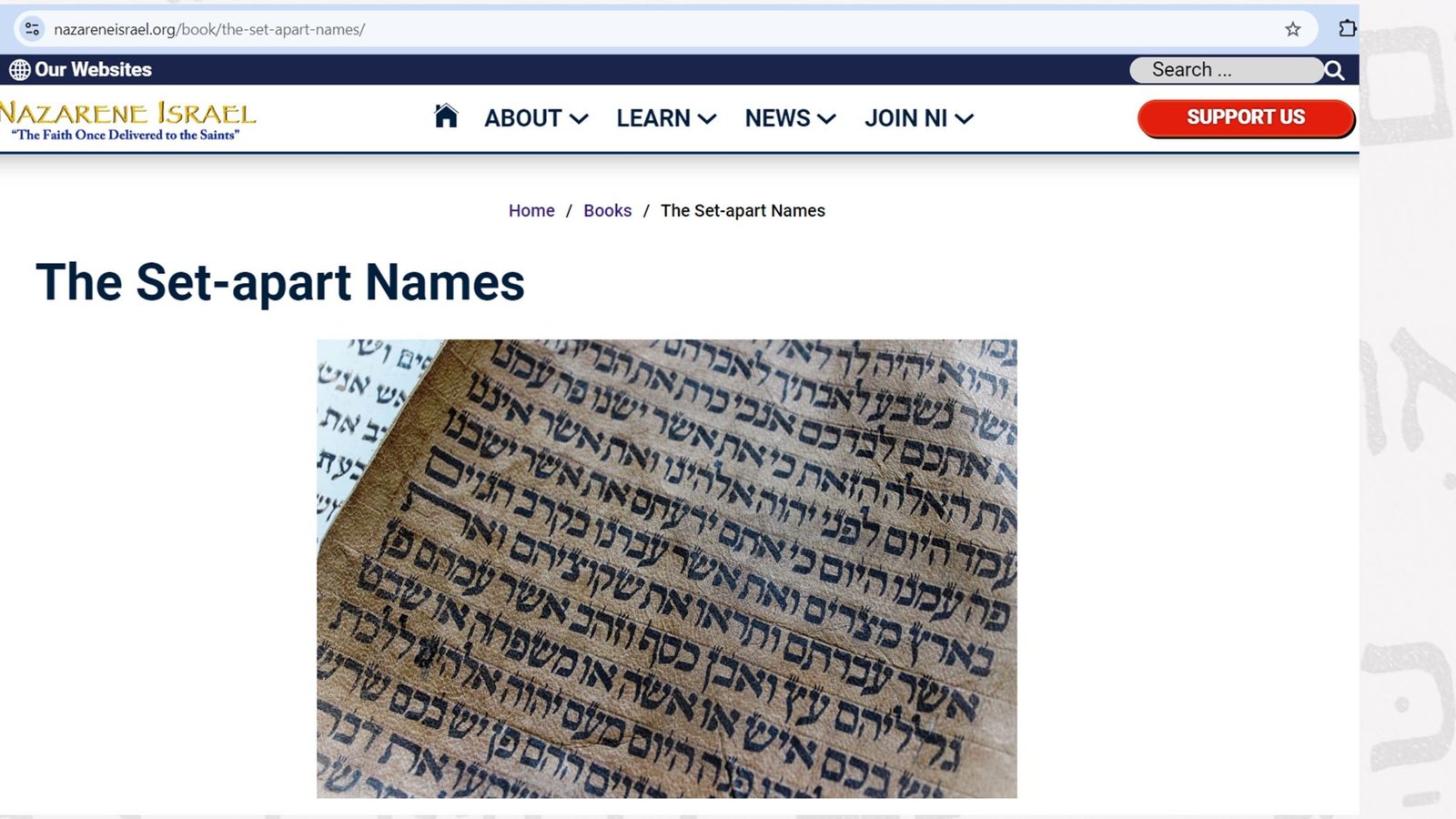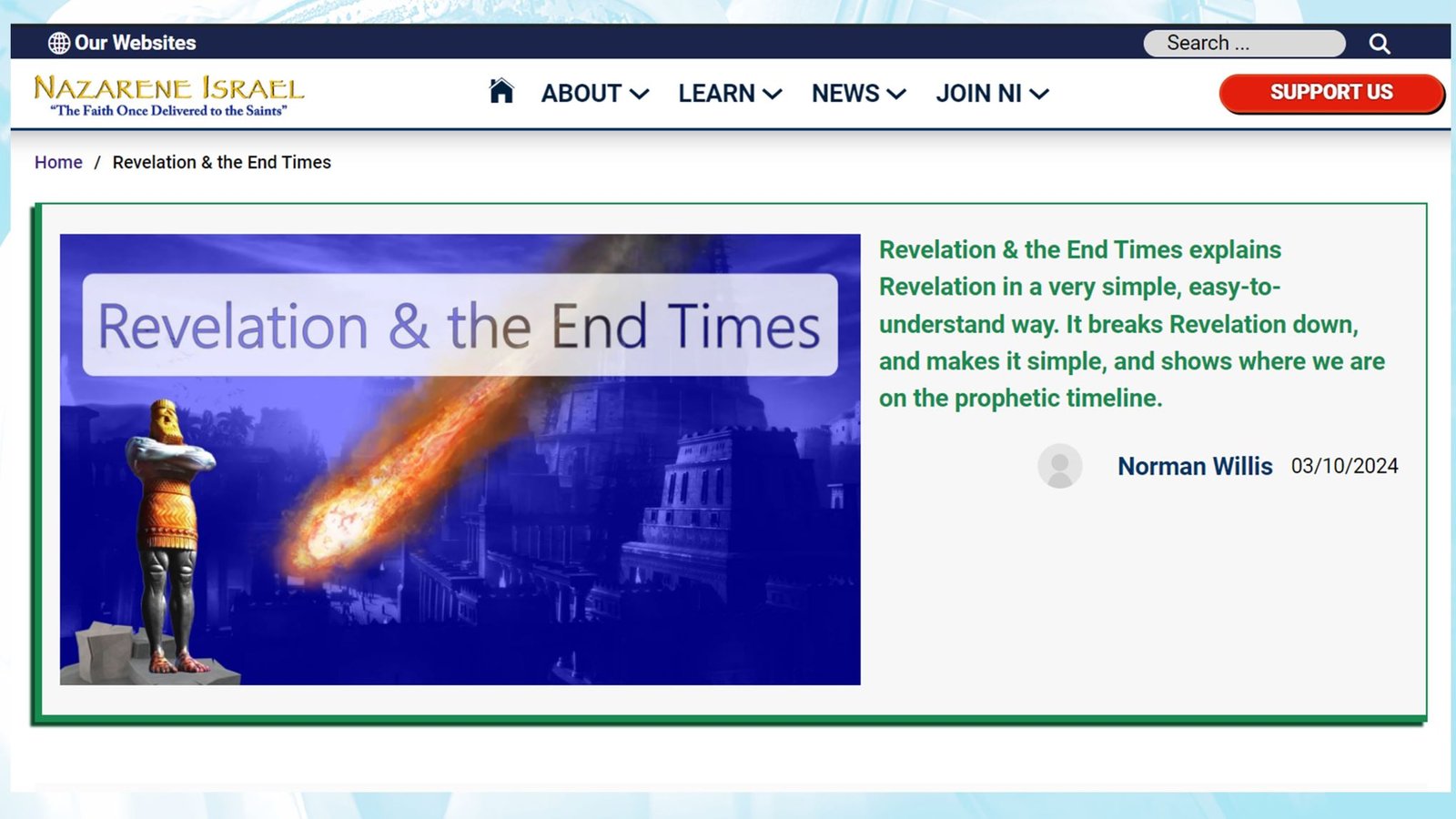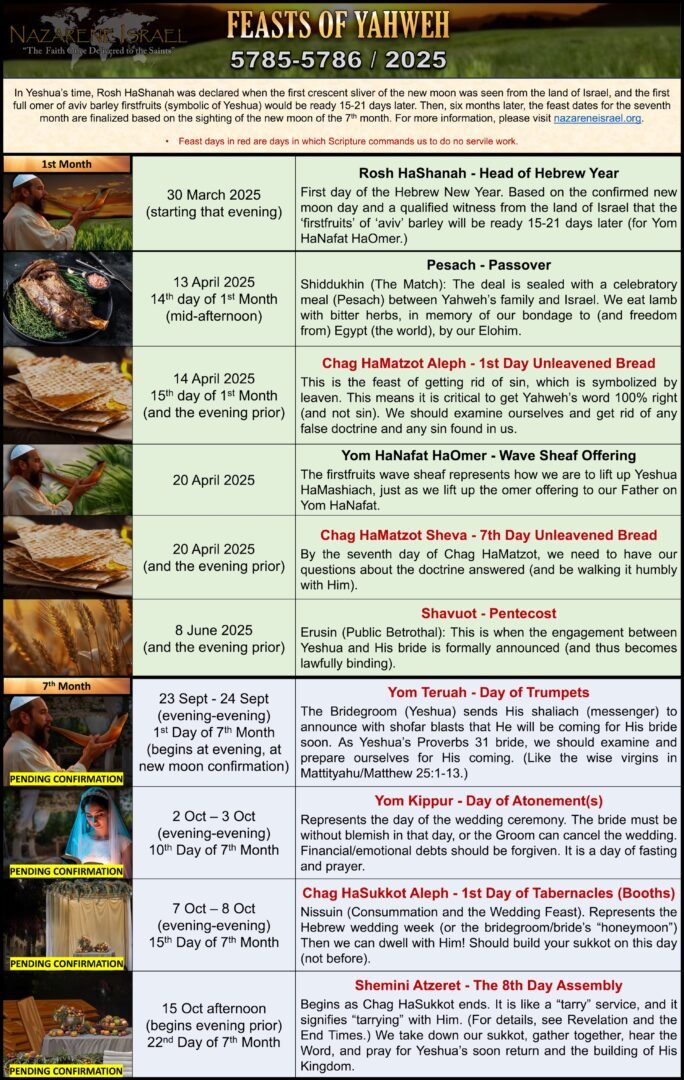Parashat Bemidbar 5784 (2024) reading:
Bemidbar (Numbers) 1:1-4:20
Hoshea (Hosea) 1-2
Luqa (Luke) 16-17
Fair Use: Pro-Israel Content, Academic Content, Autistic Content:
The following notes are a summation of the video dialogue.
This Parasha Bemidbar 5784 (2024) midrash continues Genesis 35 Alliance dialogue. It explains about the biblical definition of being Jewish and common errors about concerning Ashkenazi Jews, Khazars and Israel.
It also explains the 4 main biblical roles: the kingship, the priesthood, the prophets, and the anointed judges, how there are two types of armies of Elohim, and what all of this means for building the stick of Ephraim upon the foundation of Apostles and Prophets, in order to continue the Great Commission kingdom work, and to reunify with the house of Judah.
Ashkenazi Jews, Khazars and Israel
First, in this week’s parasha midrash, we clear up false claims concerning Ashkenazi Jews, Khazara and Israel.

We explain how quotes by the late Rebbe Schneerson relate to the current conflict in Ukraine, and research by Henrymakow.com.

(Note: Makow is pro-Esav, and Nazarene Israel does not agree with his conclusions. However, Makow’s research is generally good.)
Makow: 1994 article by Chabad leader “Rebbe” Menachem Mendel Schneerson:
“Slav, Russian, can be destroyed, but never conquered. That is why this seed is subject to liquidation, and, at first, a sharp reduction in their numbers…”
[Henrymakow.com]Schneerson: “…The Ukrainians would think that they are fighting against the expansionist Russia and struggling for their independence. They will think that they have finally gained their freedom, while they become fully subdued by us.
The same will be thought by Russians, as though they defend their national interests to return their lands, ‘illegally’ taken away from them, and so on.”
[Henrymakow.com]
We explain the Chabad’s role in the Ukraine conflict…



And the biblical definition of what makes a ‘true Jew’, and why Nazarene Israel does not reject Ashkenazi Jews, Khazars and Israel as being Jewish, and how anyone who enters fully into Yahweh’s written covenant are able to be grafted in.
Shemote (Exodus) 12:48-49 [Parasha Bo]
48 “And when a stranger dwells with you and wants to keep the Passover to Yahweh, let all his males be circumcised, and then let him come near and keep it; and he shall be as a native of the land. For no uncircumcised person shall eat it.
49 “One torah shall be for the native-born and for the stranger who dwells among you.”
For example, we see that Root (Ruth), who was born a Moabites, grafted into the covenant and became of the Jewish faith.
Root (Ruth) 1:16
16 But Ruth said: “Entreat me not to leave you, Or to turn back from following after you; For wherever you go, I will go; And wherever you lodge, I will lodge; Your people shall be my people, And your Elohim, my Elohim.”
Torah portion
In the Torah portion we explain the 4 main biblical roles in Scripture, and how the Ramban cycles (Nachmanides) correspond with events we see within these roles today. We also explain about the census, and the two types of armies of Elohim.
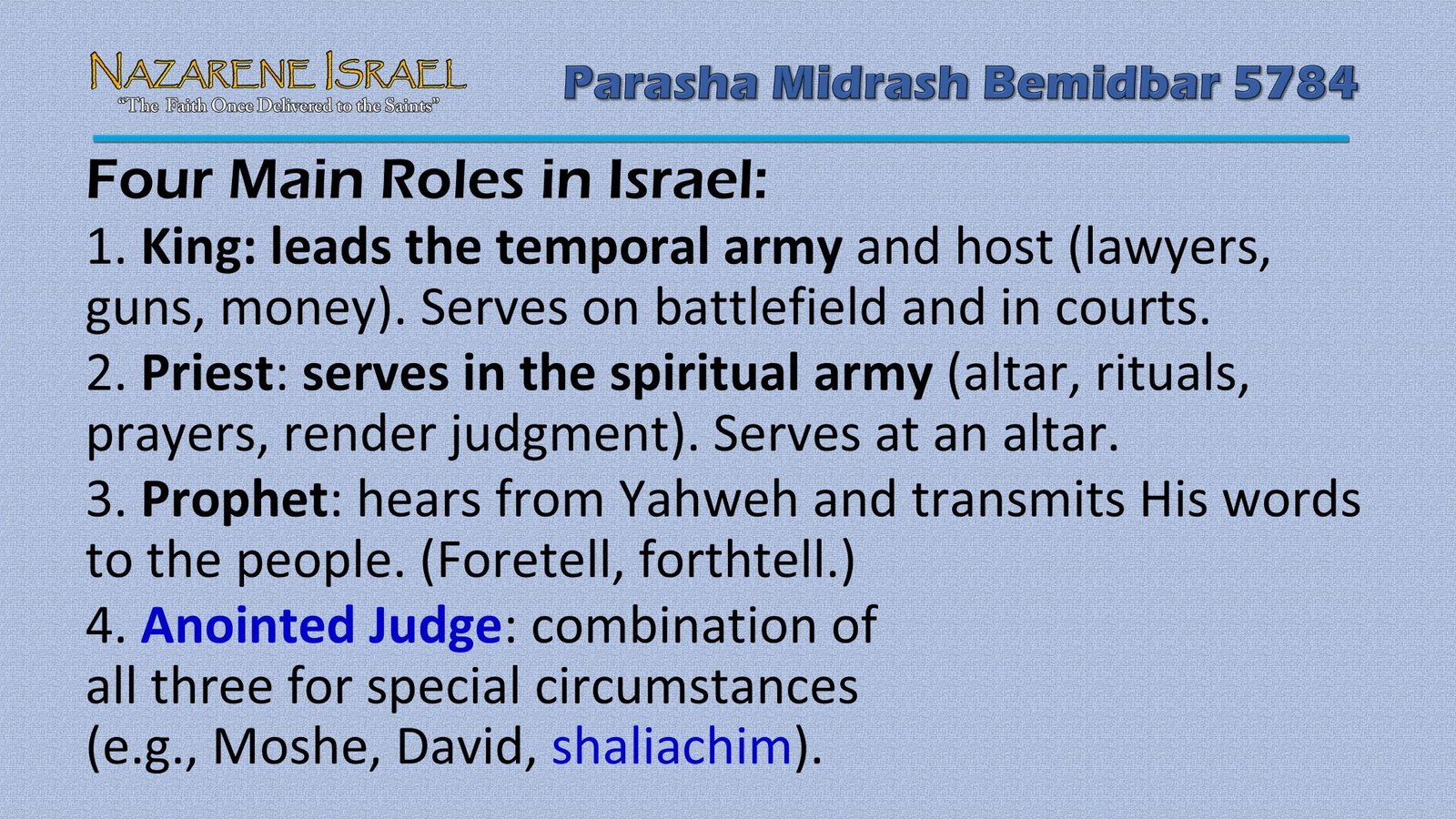
First, you have the king (hopefully, he is an obedient king in Elohim). The king leads the Temporary army and host (the support team).
The priest serves in the ‘spiritual army’. (It is not a FB post army!) The priest is responsible to care for the altar, rituals, prayers, and some judgments. And to teach the people between right and wrong before Elohim.
The Prophet places his life in Elohim’s hand, and foretells and forthtells Yahweh’s message to His people. (The prophet is not usually liked very much.)
The Anointed Judge is a combination of the kingship, the priesthood, and the prophet roles. For example, Moshe, David, and Yeshua our High Priest.
Nachmanides-Ramban cycle: ‘kill the prophet’
We explain the Ramban (Nachmanides) cycles and how they correspond with the roles.

For example, in Parasha Vayeshev, we see that the prophet Joseph was hated by his brothers, and how this foreshadows the house of Joseph going off into the prophetic pit of the Mystery Babylonian Greco-Roman pit system, and how some ‘beast’ devoured Joseph (Ephraim) and how Judah now says that there are only Judah and Noahides left.
B’reisheet (Genesis) 37:19-20 [Vayeshev]
19 Then they said to one another, “Look, this dreamer is coming!
20 “Come therefore, let us now kill him and cast him into some pit; and we shall say, ‘Some wild beast has devoured him.’ We shall see what will become of his dreams!”
We also see that after Yahweh released us from Egypt, He wanted a spiritual army who love Him enough to serve Him exactly the way He says. And how this requires effort and service on our part. And why this is such a huge problem in the Ephraimite-Christian world where very few choose to support Elohim’s kingdom work.
Shemote (Exodus) 12:12 [Parasha Bo]
12 “For I will pass through the land of Egypt on that night, and will strike all the firstborn in the land of Egypt, both man and beast; and against all the [false] elohim of Egypt I will execute judgment: I am Yahweh.”Shemote (Exodus) 13:1-2 (Parasha Bo)
1 Then Yahweh spoke to Moshe, saying:
2 “Consecrate to Me all the firstborn, whatever opens the womb among the children of Israel, both of man and beast; it is Mine.”
Levi opposes his sons, brothers
We explain that the house of Judah (specifically, the tribe of Levi) placed spiritual responsibility over flesh. And there is a Nachmanides cycles here with Levi killing the prophets. However, in this example, Levi placed Elohim first. This parallels what Yeshua taught about hating ones’ father, mother, family and placing Elohim and His kingdom first.
Shemote (Exodus) 32:27-29 [Parasha Ki Tisa]
27 And he said to them, “Thus says Yahweh Elohim of Israel: ‘Let every man put his sword on his side, and go in and out from entrance to entrance throughout the camp, and let every man kill his brother, every man his companion, and every man his neighbor.’ ”
28 So the sons of Levi did according to the word of Moshe. And about three thousand men of the people fell that day.
29 Then Moshe said, “Consecrate yourselves today to Yahweh, that He may bestow on you a blessing this day, for every man has opposed his son and his brother.”
The census
Bemidbar (Numbers) 1:1-3
1 Now Yahweh spoke to Moshe in the Wilderness of Sinai, in the tabernacle of meeting, on the first day of the second month, in the second year after they had come out of the land of Egypt, saying:
2 “Take a census of all the congregation of the children of Israel, by their families, by their fathers’ houses, according to the number of names, every male individually,
3 “from twenty years old and above—all who are able to go to war in Israel. You and Aharon shall number them by their armies.”Bemidbar (Numbers) 1:20-21
20 Now the children of Reuben, Israel’s oldest son, their genealogies by their families, by their fathers’ house, according to the number of names, every male individually, from twenty years old and above, all who were able to go to war:
21 those who were numbered of the tribe of Reuben were forty-six thousand five hundred.
Those able to ‘go to war’
We explain about the temporal, physical army of Israel (the physical strength of Israel). We do not want to place our trust in the physical army, but the physical army exists to do Yahweh’s battles as He commands.
Bemidbar (Numbers) 1:45-48
45 So all who were numbered of the children of Israel, by their fathers’ houses, from
twenty years old and above, all who were able to go to war in Israel….
46 all who were numbered were six hundred and three thousand five hundred and fifty.
47 But the Levites were not numbered among them by their fathers’ tribe;
48 for Yahweh had spoken to Moshe, saying:
Levitical priesthood vs outsiders
The spiritual army was responsible for caring for the things of Elohim (the tabernacle).
Bemidbar (Numbers) 1:49-51
49 “Only the tribe of Levi you shall not number, nor take a census of them among the children of Israel;
50 “…but you shall appoint the Levites over the tabernacle of the Testimony, over all its furnishings, and over all things that belong to it; they shall carry the tabernacle and all its furnishings; they shall attend to it and camp around the tabernacle.
51 “And when the tabernacle is to go forward, the Levites shall take it down; and when the tabernacle is to be set up, the Levites shall set it up. The outsider who comes near shall be put to death.”
No ‘outsider’ in tabernacle service
We explain the meaning of the term ‘outsider’ (זוּר) and what this means for those who are strangers to the Torah and not set-apart in Yahweh’s written Torah, and who teach another halacha (doctrine) to Elohim’s people.
Strong’s Concordance H2114
זוּר zûr zoor
A primitive root; to turn aside (especially for lodging); hence to be a foreigner, strange, profane; specifically (active participle) to commit adultery: – (come from) another (man, place), fanner, go away, (e-) strange (-r, thing, woman).
And how we can no longer be strangers and foreigners IF we enter into Yeshua’s program and into Yahweh’s written covenant. (But we must enter in through the straight, narrow gate of the original faith halacha that Yeshua taught, and we cannot enter in through any other way.)
Ephesim (Ephesians) 2:19-21
19 Now, therefore, you are no longer strangers and foreigners, but fellow citizens with the saints and members of the household of Elohim,
20 having been built on the foundation of the apostles and prophets, Yeshua Messiah Himself being the chief cornerstone,
21 in whom the whole building, being fitted together, grows into a set-apart temple in Yahweh….
Camp order and service
We explain that each army has a job to do. The Levitical (spiritual) army has a job to keep the charge of the tabernacle and to teach the people the difference between the set-part and the profane.
Bemidbar (Numbers) 1:52-53
52 “The children of Israel shall pitch their tents, everyone by his own camp, everyone by his own standard, according to their armies;
53 “but the Levites shall camp around the tabernacle of the Testimony, that there may be no wrath on the congregation of the children of Israel; and the Levites shall keep charge of the tabernacle of the Testimony.”Bemidbar (Numbers) 2:3-7
3 “On the east side, toward the rising of the sun, those of the standard of the forces with Judah shall camp according to their armies; and Nahshon the son of Amminadab shall be the leader of the children of Judah.”
4 And his army was numbered at seventy-four thousand six hundred.
5 And Yahweh spoke to Moshe, saying:
6 “Bring the tribe of Levi near, and present them before Aharon the priest, that they may serve him.
7 “And they shall attend to his needs and the needs of the whole congregation before the tabernacle of meeting, to do the work of the tabernacle.”
Definition of what it means to work/serve Yahweh
We explain the true meaning of what it means to work for/serve Elohim. And how ministers teaching another doctrine from what Yeshua HaMashiach are outsiders to the covenant. And those teaching other doctrines will need to answer in the day of judgment having done something other than what HaMashiach said to do.
Strong’s Concordance H5647
עָבַד ‛âbad aw-bad’
A primitive root; to work (in any sense); by implication to serve, till, (causatively) enslave, etc.: – X be, keep in bondage, be bondmen, bond-service, compel, do, dress, ear, execute, + husbandman, keep, labour (-ing man), bring to pass, (cause to, make to) serve (-ing, self), (be, become) servant (-s), do (use) service…Bemidbar (Numbers) 3:8-9
8 “Also they shall attend to all the furnishings of the tabernacle of meeting, and to the needs of the children of Israel, to do the work of the tabernacle.
9 “And you shall give the Levites to Aharon and his sons; they are given entirely to him from among the children of Israel.”
10 “So you shall appoint Aharon and his sons, and they shall attend to their priesthood; but the outsider who comes near shall be put to death.”
The Levites and the redeemed
11 Then Yahweh spoke to Moshes, saying:
12 “Now behold, I Myself have taken the Levites from among the children of Israel instead of every firstborn who opens the womb among the children of Israel. Therefore the Levites shall be Mine…”13 “…because all the firstborn are Mine. On the day that I struck all the firstborn in the land of Egypt, I set apart to Myself all the firstborn in Israel, both man and beast. They shall be Mine: I am Yahweh.”
14 Then Yahweh spoke to Moshe in the Wilderness of Sinai, saying:
15 “Number the children of Levi by their fathers’ houses, by their families; you shall number every male from a month old and above.”
16 So Moshe numbered them according to the word of Yahweh, as he was commanded.Bemidbar (Numbers) 3:39
39 All who were numbered of the Levites, whom Moshe and Aharon numbered at the commandment of Yahweh, by their families, all the males from a month old and above, were twenty-two thousand.
40 Then Yahweh said to Moshe: “Number all the firstborn males of the children of Israel from a month old and above, and take the number of their names.41 “And you shall take the Levites for Me—I am Yahweh—instead of all the firstborn among the children of Israel, and the livestock of the Levites instead of all the firstborn among the livestock of the children of Israel.”
42 So Moshe numbered all the firstborn among the children of Israel, as Yahweh commanded him.
43 And all the firstborn males, according to the number of names from a month old and above, of those who were numbered of them, were twenty-two thousand two hundred and seventy-three.44 Then Yahweh spoke to Moshe, saying:
45 “Take the Levites instead of all the firstborn among the children of Israel, and the livestock of the Levites instead of their livestock. The Levites shall be Mine: I am Yahweh.”
Redeeming the firstborn
46 “And for the redemption of the two hundred and seventy-three of the firstborn of the children of Israel, who are more than the number of the Levites,
47 “you shall take five shekels for each one individually; you shall take them in the currency of the shekel of the sanctuary, the shekel of twenty gerahs.”48 “And you shall give the money, with which the excess number of them is redeemed, to Aharon and his sons.”
Bemidbar (Numbers) 4:1-3 NKJV
1 Then Yahweh spoke to Moshe and Aharon, saying:
2 “Take a census of the sons of Kohath from among the children of Levi, by their families, by their fathers’ house,
3 “from thirty years old and above, even to fifty years old, all who enter the service to do the work in the tabernacle of meeting.”
Sons of Kohath
Bemidbar (Numbers) 4:1-3 KJV
1 And Yahweh spoke unto Moses and unto Aharon, saying,
2 “Take the sum of the sons of Kohath from among the sons of Levi, after their families, by the house of their fathers,
3 “From thirty years old and upward even until fifty years old, all that enter into the host, to do the work in the tabernacle of the congregation.”Strong’s Concordance
H6635
צְבָאָה צָבָא tsâbâ’ tsebâ’âh
From H6633; a mass of persons (or figurative things), especially regularly organized for war (an army); by implication a campaign, literally or figuratively (specifically hardship, worship): – appointed time, (+) army, (+) battle, company, host, service, soldiers, waiting upon, warTimaTheus Bet (2 Timothy) 2:3-4
3 You therefore must endure hardship as a good soldier of Yeshua HaMashiach.
4 No one engaged in warfare entangles himself with the affairs of this life, that he may please him who enlisted him as a soldier.
Haftarah portion
This week’s Haftarah portion is for Hoshea (Hosea) chapter 2, and we are going to cover chapters 1 also, for context. Hoshea is considered a minor prophet, and he speaks to both houses. But he is a major prophet for the house of Ephraim, and Ephraim needs to understand Hoshea’s prophecies.
Prophecy of returning Ephraim (Joseph)
Hoshea (Hosea) 1:1-3
1 The word of Yahweh that came to Hoshea the son of Beeri, in the days of Uzziah, Jotham, Ahaz, and Hezekiah, kings of Judah, and in the days of Jeroboam the son of Joash, king of Israel.
2 When Yahweh began to speak by Hoshea, Yahweh said to Hoshea: “Go, take yourself a wife of harlotry and children of harlotry, For the land has committed great harlotry by departing from Yahweh.”
3 So he went and took Gomer the daughter of Diblaim, and she conceived and bore him a son.
We explain that the term (name) Gomer basically means that you are done, or a major fail.
Strong’s Concordance
H1586
גֹּמֶר gômer go’-mer
From H1584; completion; Gomer, the name of a son of Japheth and of his descendants; also of a Hebrewess: – Gomer.Strong’s Concordance
H1584
גָּמַר gâmar gaw-mar’
A primitive root; to end (in the sense of completion or failure): – cease, come to an end, fail, perfect, perform
We explain that Yahweh does not say that He will bring an end to the people of Israel (the northern kingdom of the house of Ephraim), but that He will bring to end the ‘kingdom’ of the northern kingdom of Israel.
Hoshea (Hosea) 1:4
4 Then Yahweh said to him: “Call his name Yizre’el, For in a little while I will avenge the bloodshed of Yizre’el on the house of Yehu, And bring an end to the kingdom of the house of Israel.Strong’s Concordance
H3157
יִזְרְעֵאל yizre‛ê’l yiz-reh-ale’
From H2232 and H410; Elohim will sow; Jizreel, the name of two places in Palestine and of two Israelites: – Jezreel.Strong’s Concordance
H2232
זָרַע zâra‛ zaw-rah’
A primitive root; to sow; figuratively to disseminate, plant, fructify: – bear, conceive seed, set with, sow (-er), yield.
King Jeroboam (king of the northern house of Israel) did not like prophets, and did not obey Elohim. And the people of the northern house of Israel (Ephraim, Joseph) were taken into the Assyrian Diaspora. Ephraim is taken away and scattered through all of the earth as seed.
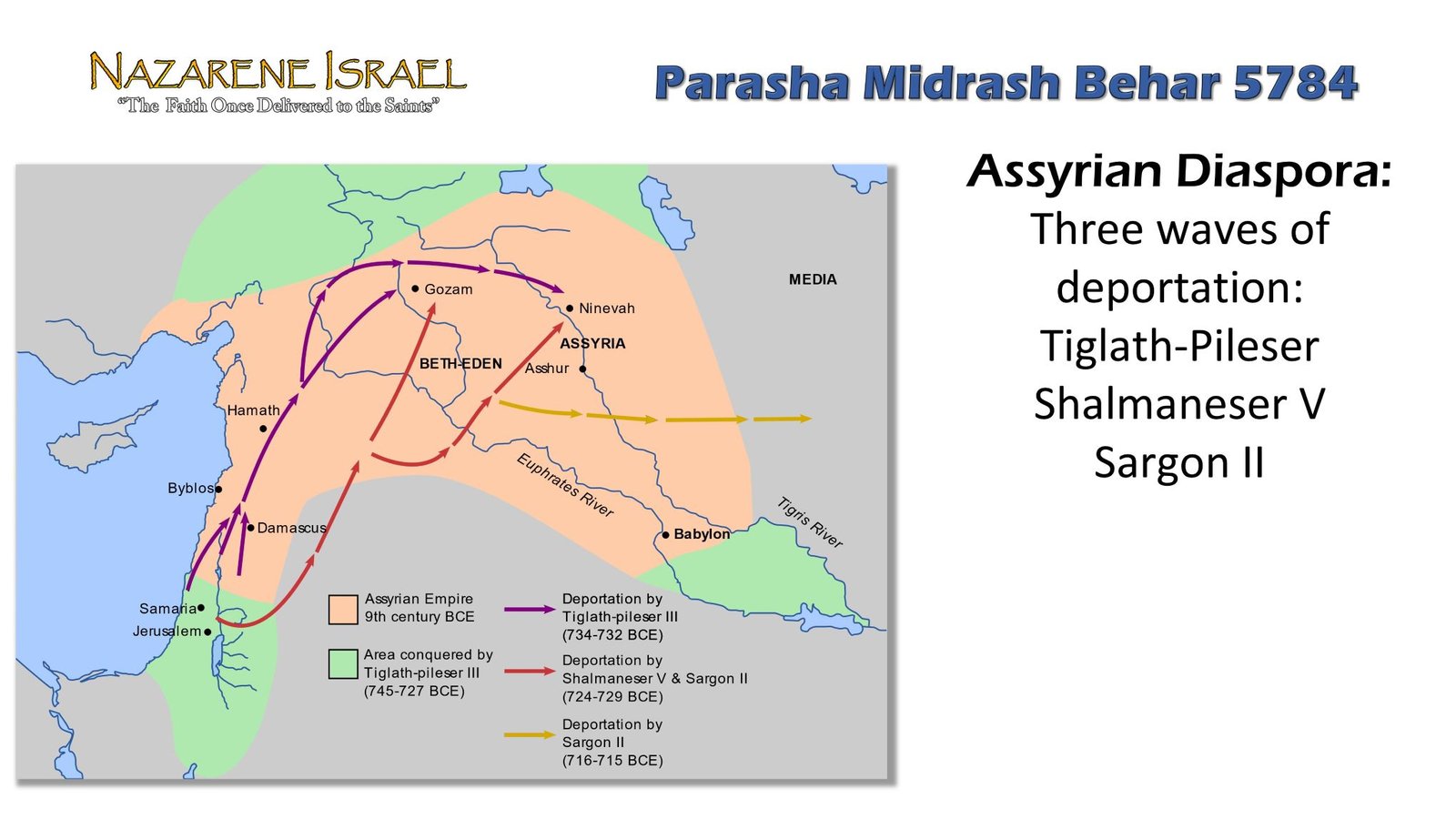
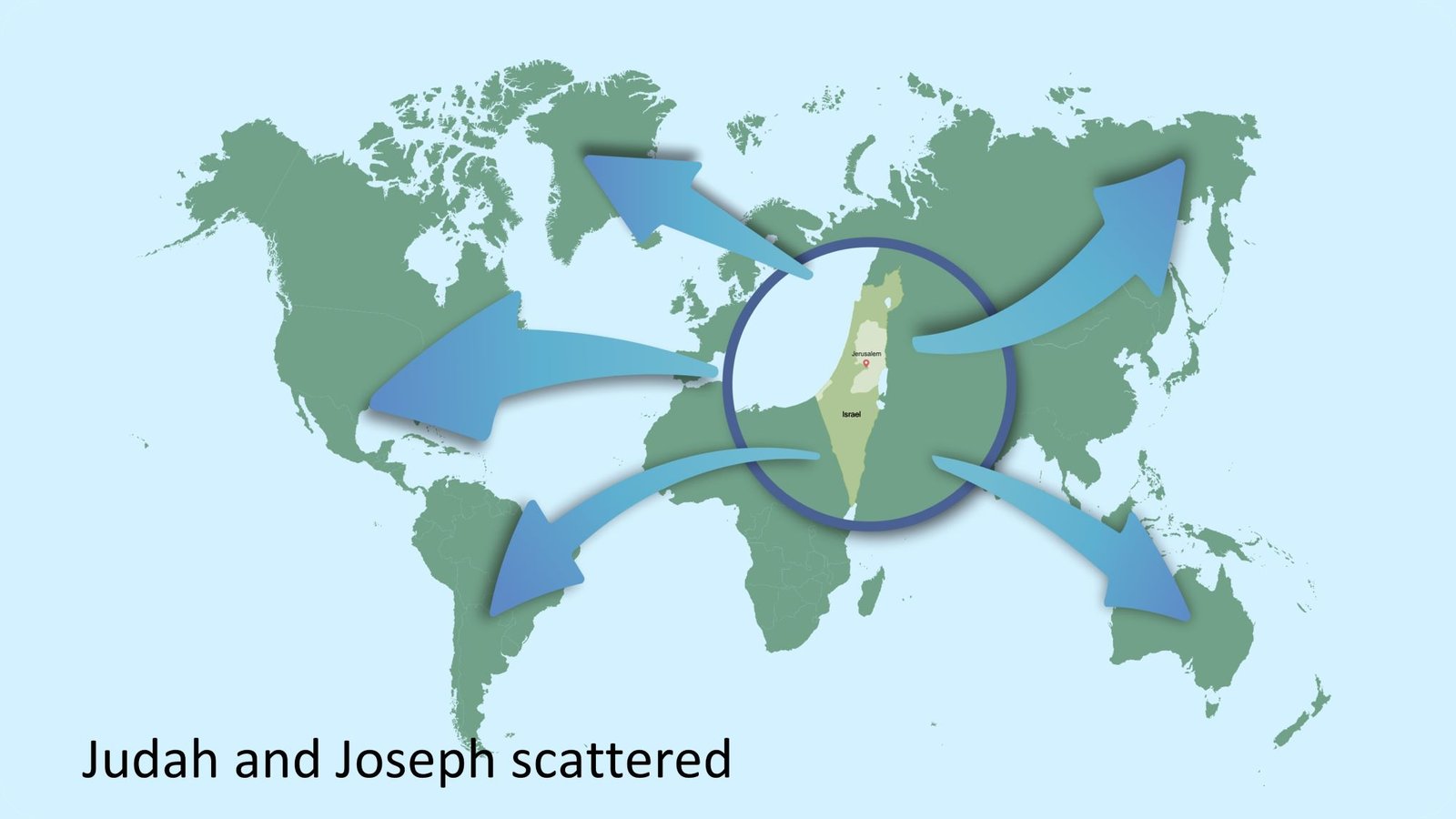
Hoshea (Hosea) 1:6
6 And she conceived again and bore a daughter. Then Elohim said to him: “Call her name Lo-Ruhamah, For I will no longer have mercy on the house of Israel, But I will utterly take them away.”Strong’s Concordance
H3819
לֹא רֻחָמָה lô’ rûchâmâh lo roo-khaw-maw’
From H3808 and H7355; not pitied; lo Ruchamah, the symbolical name of a son of Hosea: – Lo-ruhamah
Yahweh removes His mercy from the house of Ephraim (the northern house of Israel, or the 10 tribes). And He says that because the northern house of Israel did not obey His covenant, He will no longer be our Elohim. (Judah, heed this warning!)
Strong’s Concordance
H7355
רָחַם râcham raw-kham’
A primitive root; to fondle; by implication to love, especially to compassionate: – have compassion (on, upon), love, (find, have, obtain, shew) mercy (-iful, on, upon), (have) pity, Ruhamah, X surely.Hoshea (Hosea) 1:8-9
8 Now when she had weaned Lo-Ruhamah, she conceived and bore a son.
9 Then Elohim said: “Call his name Lo-Ammi, For you are not My people, And I will not be your Elohim.”
The definitions of what makes a people (a tribe, a troop, a united body with a united purpose). We explain that every different belief set (halachot) is a different nation in Scripture. And that one nation of people must have a united halacha.
Strong’s Concordance
H3818
לֹא עַמִּי lô’ ‛ammı̂y lo am-mee’
From H3808 and H5971 with pronominal suffix, not my people; lo Ammi, the symbolical name of a son of Hosea: – Lo-ammi.Strong’s H5971
עַם ‛am am
From H6004; a people (as a congregated unit); specifically a tribe (as those of Israel); hence (collectively) troops or attendants; figuratively a flock: – folk, men, nation, people.
Hoshea then says that the northern house of Israel will still be as the sand of the sea, as are the some 2.2 billion Christians today. (There is a large number of Esavite Christians and a small number of white-horse Josephite Christians.) And we will again be Yahweh Elohim’s people.
Hoshea (Hosea) 1:10 [JPS 2:1]
10 “Yet the number of the children of Israel Shall be as the sand of the sea, Which cannot be measured or numbered. And it shall come to pass In the place where it was said to them, ‘You are not My people,’ There it shall be said to them, ‘You are sons of the living Elohim.’”Yeshayahu (Isaiah) 10:20-23
20 “And it shall come to pass in that day That the remnant of Israel, And such as have escaped of the house of Jacob, Will never again depend on him who defeated them, But will depend on Yahweh, the Set-apart One of Israel, in truth.”
However, of the 2.2 billion some of Christians today, very few will return.
21 “The remnant will return, the remnant of Jacob, To the Mighty Elohim.
22 “For though your people, O Israel, be as the sand of the sea, A remnant of them will return; The destruction decreed shall overflow with righteousness.
23 “For Yahweh Elohim of hosts will make a determined end in the midst of all the land.”Hoshea (Hosea) 1:11 [JPS 2:2]
11 “Then the children of Judah and the children of Israel Shall be gathered together, And appoint for themselves one head; And they shall come up out of the land, For great will be the day of Jezreel!”Hoshea (Hosea) 2:1 [JPS 2:3]
1 “Say to your brethren, ‘My people [Ami],’ And to your sisters, ‘Mercy is shown [Ruhamah].’
Ephraim is told to bring charges against our mother (Mystery Babylon Roman-Greco church system). For she is not in the marital covenant with Yahweh. She denies Yahweh’s written Torah and says it is ‘nailed to the cross’. The house of Ephraim must ‘come out of’ Babylon and enter back into Elohim’s covenant.
Hoshea (Hosea) 2:2 [JPS 2:4]
2 “Bring charges against your mother, bring charges; For she is not My wife, nor am I her Husband! Let her put away her harlotries from her sight, And her adulteries from between her breasts…”Hoshea (Hosea) 2:3-4 [JPS 2:5-6]
3 “Lest I strip her naked And expose her, as in the day she was born, And make her like a wilderness, And set her like a dry land, And slay her with thirst.
4 “I will not have mercy on her children, For they are the children of harlotry.”
Are you obeying everything the Renewed Covenant says? Is your walk pure and clean? Are you entering into Yeshua’s program? Or are you making excuses? That tells you what side of the Hoshea prophecies you are on.
Hoshea (Hosea) 2:5-6 [JPS 2:7-8]
5 “For their mother has played the harlot; She who conceived them has behaved shamefully. For she said, ‘I will go after my lovers, Who give me my bread and my water, My wool and my linen, My oil and my drink.’
6 “Therefore, behold, I will hedge up your way with thorns, And wall her in, So that she cannot find her paths.”Hitgalut (Revelation) 17:1
1 Then one of the seven messengers who had the seven bowls [cups] came and talked with me, saying to me, “Come, I will show you the judgment of the great harlot who sits on many waters…”
What is happening in the United States of America today? We talk in Revelation and End Times about America the Land of Babylon. Ephraim has given himself into the hand of the harlot.
“I will go after my lovers” but will not over take them. And she (Ephraim) will return to Yahweh Elohim. (If you want to know about how the term ‘the Lord’ means ‘Baal’, please read our study on the Set-Apart Names.)
Hoshea (Hosea) 2:7-8 [JPS 2:9-10]
7 “She will chase her lovers, But not overtake them; Yes, she will seek them, but not find them. Then she will say, ‘I will go and return to my first husband, For then it was better for me than now.‘
8 For she did not know That I gave her grain, new wine, and oil, And multiplied her silver and gold—Which they prepared for Baal [the Lord].”
Hoshea (Hosea) 2:9-10 [JPS 2:11-12]
9 “Therefore I will return and take away My grain in its time And My new wine in its season, And will take back My wool and My linen, Given to cover her nakedness.
10 “Now I will uncover her lewdness in the sight of her lovers, And no one shall deliver her from My hand.”
Babylon will not be a good place to live during the end-times.
Hoshea (Hosea) 2:11-12 [JPS 2:13-14]
11 “I will also cause all her mirth to cease, Her [false] feast days, Her [false] New Moons, Her [false] Sabbaths—All her appointed feasts.
12 “And I will destroy her vines [churches] and her fig trees [synagogues], Of which she has said, ‘These are my wages that my lovers have given me.’ So I will make them a forest, And the beasts of the field shall eat them.”
Do we believe Yahweh when He speaks of the destruction of the United States and for His people to leave? Do we believe Him when He says that His judgment is coming upon false elohim Baal (the Lord), HaShem, Adonai?
Hoshea (Hosea) 2:13-14 [JPS 2:15-16]
13 “I will punish her For the days of the Baals [Lords] to which she burned incense. She decked herself with her earrings and jewelry, And went after her lovers; But Me she forgot,” says Yahweh.
14 “Therefore, behold, I will allure her, Will bring her into the wilderness, And speak comfort to her.”Hoshea (Hosea) 2:15 [JPS 2:17]
15 “I will give her her vineyards from there, And the Valley of Achor as a door of hope; She shall sing there, As in the days of her youth, As in the day when she came up from the land of Egypt.”Strong’s Concordance
H5911
עָכוֹר ‛âkôr aw-kore’
From H5916; troubled; Akor, the name of a place in Palestine: – Achor.
After WW3, after the civil war in the US, and after WW4 (Armageddon):
Hoshea (Hosea) 2:16-17 [JPS 2:18-19]
16 “And it shall be, in that day,” Says Yahweh, “That you will call Me ‘My Man,’ [Ishi] And no longer call Me ‘Ba’ali’ [‘My Lord’].
17 “For I will take from her mouth the names of the Baals [the Lords], And they shall be remembered by their name no more.”
Yehezqel chapter 39 speaks about the first war of Gog and Magog (Armageddon, or the wedding banquet), and that Ephraim will then know that Yahweh is our Elohim. There will be a lot of death, but those who leave behind Mystery Babylon and enter into the marriage covenant with Yahweh Elohim will be able to take part in the wedding Millennial reign of Yeshua HaMashiach.
Yehezqel (Ezekiel) 39:22-23
22 “So the house of Israel shall know that I am Yahweh their Elohim from that day forward.
23 “The Gentiles shall know that the house of Israel went into captivity for their iniquity; because they were unfaithful to Me, therefore I hid My face from them. I gave them into the hand of their enemies, and they all fell by the sword.”Hoshea (Hosea) 2:18 [JPS 2:20]
18 “In that day I will make a covenant for them With the beasts of the field, With the birds of the air, And with the creeping things of the ground. Bow and sword of battle I will shatter from the earth, To make them lie down safely.”Yehezqel (Ezekiel) 39:17
17 “And as for you, son of man, thus says Yahweh Elohim, ‘Speak to every sort of bird and to every beast of the field: “Assemble yourselves and come; Gather together from all sides to My sacrificial meal Which I am sacrificing for you, A great sacrificial meal on the mountains of Israel, That you may eat flesh and drink blood.”Hoshea (Hosea) 2:19-20 [JPS 2:21-22]
19 “I will betroth you to Me forever; Yes, I will betroth you to Me In righteousness and justice,
In lovingkindness and mercy;
20 “I will betroth you to Me in faithfulness, And you shall know Yahweh.”Hoshea (Hosea) 2:21-22 [JPS 2:23-24]
21 “It shall come to pass in that day That I will answer,” says Yahweh; “I will answer the heavens, And they shall answer the earth.
22 “The earth shall answer With grain, With new wine, And with oil; They shall answer Yizre’el.”Hoshea (Hosea) 2:23 [JPS 2:25]
23 “Then I will sow her for Myself in the earth, And I will have mercy on her who had not obtained mercy; Then I will say to those who were not My people, ‘You are My people!’ “And they shall say, ‘You are my Elohim!’”
What does it mean to be Elohim’s people? Ephraim behaves like they do not even know they have an Elohim, and they read about what to do, but then they do not do it. And Judah says yes to Elohim, and then go to do their own thing.
Yehezqel (Ezekiel) 39:25
25 “Therefore thus says Yahweh Elohim: ‘Now I will bring back the captives of Jacob, and have mercy on the whole house of Israel; and I will be jealous for My set-apart name—
If you enjoy living in the United States of America, Latin America, Protestant western Europe, or in the x-British empires, for example, these are the ‘enemies’ lands’.
Yehezqel (Ezekiel) 39:27-28
27 When I have brought them back from the peoples and gathered them out of their enemies’ lands, and I am set-apart in them in the sight of many nations,
28 then they shall know that I am Yahweh their Elohim, who sent them into captivity among the nations, but also brought them back to their land, and left none of them captive any longer.”
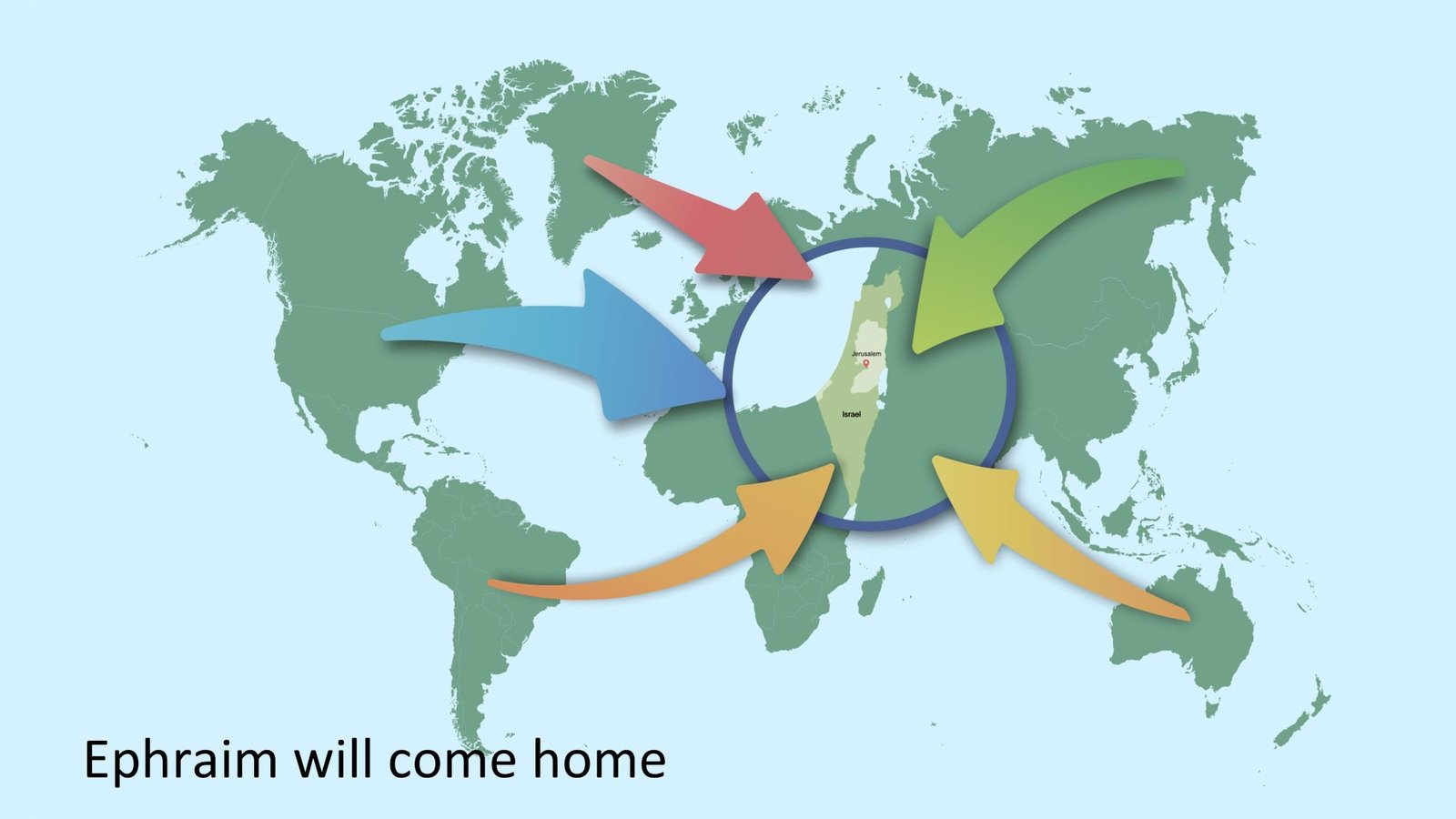
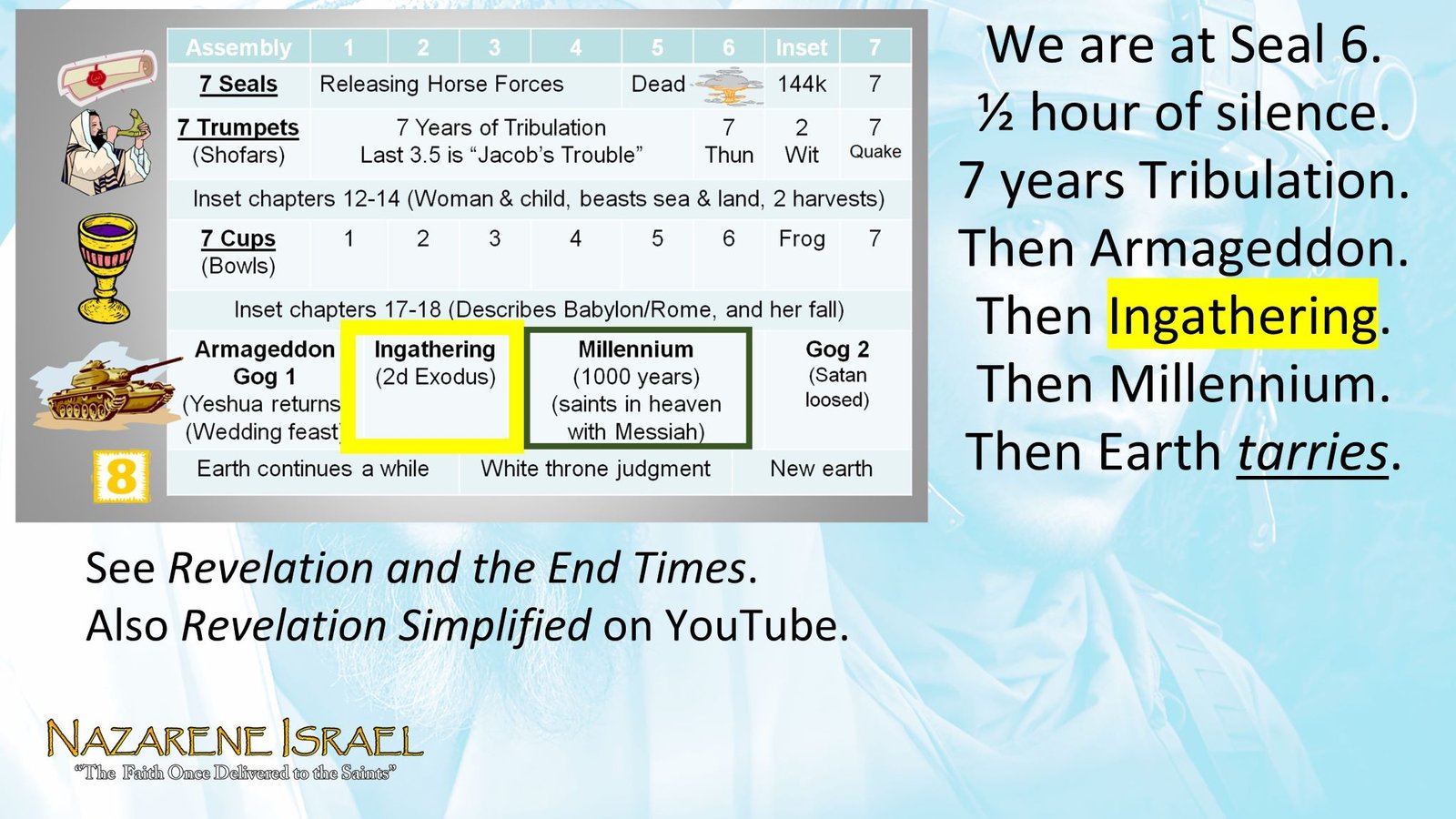
Brit Chadasha portion
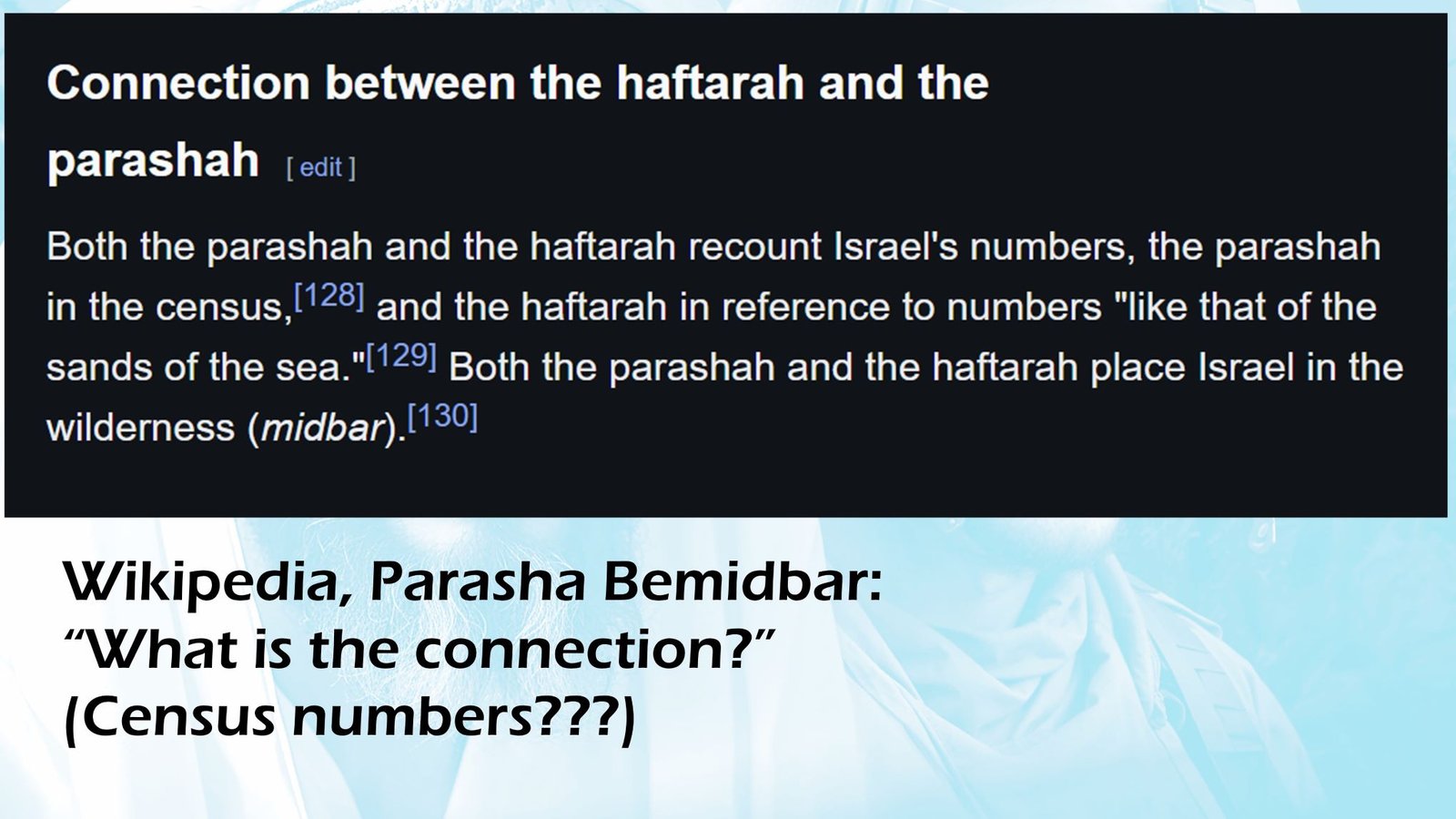
What is the relation between the Torah portion and the Haftarah portion? Wikipedia states that both the Torah portion and the Haftarah portion recount Israel’s numbers. The Torah in the census, and the haftarah in the reference to numbers “like that of the sands of the sea”. And both potions place Israel in the wilderness.
Beit Lechem
In the Brit Chadasha portion we explain about the census that took place during Caesar Augustus, the and meaning of Beit Lechem.
Luqa (Luke) 2:1-5
1 And it came to pass in those days that a decree went out from Caesar Augustus that all the world should be registered.
2 This census first took place while Quirinius was governing Syria.
3 So all went to be registered, everyone to his own city.
4 Joseph also went up from Galilee, out of the city of Nazareth, into Judea, to the city of David, which is called Beit Lechem, because he was of the house and lineage of David…
5 to be registered with Miriam, his betrothed wife, who was with child.Strong’s Concordance
H1035|
בֵּית לֶחֶם bêyth lechem bayth leh’-khem
From H1004 and H3899; house of bread; Beth-Lechem, a place in Palestine: – Beth-lehem.Strong’s Concordance
H3898
לָחַם lâcham law-kham’
A primitive root; to feed on; figuratively to consume;
by implication to battle (as destruction): – devour, eat, X ever, fight (-ing), overcome, prevail, (make) war (-ring).
Those who are sealed
Then we explain the end-time prophecies of Revelation 7, and who is and is not sealed as part of the kingdom. And what this means for those who remain in the Mystery Babylonian Roman-Greco church system rather than entering into Yeshua’s program and doing everything according to the straight and narrow walk of the original halacha.
Hitgalut (Revelation) 7:4-6
4 And I heard the number of those who were sealed. One hundred and forty-four thousand of all the tribes of the children of Israel were sealed:
5 of the tribe of Judah twelve thousand were sealed; of the tribe of Reuben twelve thousand were sealed; of the tribe of Gad twelve thousand were sealed…
6 of the tribe of Asher twelve thousand were sealed; of the tribe of Naphtali twelve thousand were sealed; of the tribe of Manasseh twelve thousand were sealed;Hitgalut (Revelation) 7:7-8 [Harlot Version]
7 of the Catholics twelve thousand were sealed; of the Protestants twelve thousand were sealed; of the Messianics twelve thousand were sealed; of the Independents twelve thousand were sealed…
8 of the Chaos Salesmen twelve thousand were sealed; of the Slackers twelve thousand were sealed; of the Disobedient twelve thousand were sealed…”
Those who excuse themselves from the kingdom
We explain the Parable of Luke 14, where Ephraim makes excuses for not entering into the marital covenant in service to Elohim and His kingdom. And how Elohim will take anyone who is willing to enter in, and that He will not take anyone who makes excuses for not entering into His kingdom the way He commands.
Luqa (Luke) 14:18-24 [Bechukotai]
18 “But they all with one accord began to make excuses. The first said to him, ‘I have bought a piece of ground, and I must go and see it. I ask you to have me excused.’
19 And another said, ‘I have bought five yoke of oxen, and I am going to test them. I ask you to have me excused.’
20 Still another said, ‘I have married a wife, and therefore I cannot come.’
21 “So that servant came and reported these things to his master. Then the master of the house, being angry, said to his servant, ‘Go out quickly into the streets and lanes of the city, and bring in here the poor and the maimed and the lame and the blind.’…”22 “And the servant said, ‘Master, it is done as you commanded, and still there is room.’
23 “Then the master said to the servant, ‘Go out into the highways and hedges, and compel them to come in, that my house may be filled.
24 “For I say to you that none of those men who were invited shall taste my supper.’
No doctrine to “agree to disagree”
Ephraim is to help one another walk the true doctrine. Ephraim looks for reasons to divide, split, and each do their own thing. Yahweh’s doctrine is that “iron sharpens iron”. And for His servants who hear and obey His voice to teach the people the difference between set-apart things and the profane. And to correct in love when the people do wrong.
Luqa (Luke) 17:1-4
1 Then He said to the disciples, “It is impossible that no offenses should come, but woe to him through whom they do come!
2 It would be better for him if a millstone were hung around his neck, and he were thrown into the sea, than that he should offend one of these little ones.”
3 “Take heed to yourselves. If your brother sins against you, rebuke him; and if he repents, forgive him.
4 “And if he sins against you seven times in a day, and seven times in a day returns to you, saying, ‘I repent,’ you shall forgive him.”
Yahweh is talking about a relationship of ‘service’. Ephraim is here to serve Elohim, and not the other way around. In Judaism it is necessary to be united and to all work toward the same kingdom purpose. Christianity is a broad and easy road where everyone has the kingdom already and nobody needs to do anything for Elohim.
Luqa (Luke) 17:6-8
5 And the apostles said to the Master, “Increase our faith.”
6 So the Master said, “If you have faith as a mustard seed, you can say to this mulberry tree, ‘Be pulled up by the roots and be planted in the sea,’ and it would obey you.”
7 “And which of you, having a servant plowing or tending sheep, will say to him when he has come in from the field, ‘Come at once and sit down to eat‘?
8 “But will he not rather say to him, ‘Prepare something for my supper, and gird yourself and serve me till I have eaten and drunk, and afterward you will eat and drink’?”
In Judaism, if there is no fruit, their is no faith. If we are His servants, what are we doing each day to serve Him? Humility produces faith. Elohim’s will is for us to be in His humble service.
Luqa (Luke) 17:9-10
9 “Does he thank that servant because he did the things that were commanded him? I think not.
10 “So likewise you, when you have done ALL those things which you are commanded, say, ‘We are unprofitable servants. We have done what was our duty to do.’”
Parable of the ten lepers
What do we learn from the parable of the ten lepers and the census? Physically, only 1 of 10 lepers returned to give thanks for the healing he received. Only 1 of 10 lepers fell down to worship Elohim, and this was a foreigner (perhaps, an Ephraimite?) And only a remnant will return home to the Land after Armageddon, because the majority of Ephraim will remain in Mystery Babylon.
Luqa (Luke) 17:11-21
11 Now it happened as He went to Jerusalem that He passed through the midst of Samaria and Galilee.
12 Then as He entered a certain village, there met Him ten men who were lepers, who stood afar off.
13 And they lifted up their voices and said, “Yeshua, Master, have mercy on us!”14 So when He saw them, He said to them, “Go, show yourselves to the priests.” And so it was that as they went, they were cleansed.
15 And one of them, when he saw that he was healed, returned, and with a loud voice glorified Elohim,
16 and fell down on his face at His feet, giving Him thanks. And he was a Samaritan.17 So Yeshua answered and said, “Were there not ten cleansed? But where are the nine?
18 “Were there not any found who returned to give glory to Elohim except this foreigner?”
19 And He said to him, “Arise, go your way. Your faith has made you well.”
20 Now when He was asked by the Pharisees when the kingdom of Elohim would come, He answered them and said, “The kingdom of Elohim does not come with observation;
21 nor will they say, ‘See here!’ or ‘See there!’ For indeed, the kingdom of Elohim is within you.”
As in the days of Noach
Yahweh is not interested in a large census. Or in the large number of those giving lip-service while spending their time for their own enjoyment. He is interested in those few who choose to do the things that He commands, and how want to serve Him and to build His kingdom the way He wants it built.
Ma’asei (Acts) 1:6-7
6 Therefore, when they had come together, they asked Him, saying, “Adon, will You at this time restore the kingdom to Israel?”
7 And He said to them, “It is not for you to know times or seasons which the Father has put in His own authority…”Luqa (Luke) 17:22-25
22 Then He said to the disciples, “The days will come when you will desire to see one of the days of the Son of Man, and you will not see it.
23 And they will say to you, ‘Look here!’ or ‘Look there!’ Do not go after them or follow them.”
24 “For as the lightning that flashes out of one part under heaven shines to the other part under heaven, so also the Son of Man will be in His day.
25 “But first He must suffer many things and be rejected by this generation.”
The majority of Ephraimites fall into the category of those in the days of Noach. People are doing their favorite things for their own enjoyment. Going hiking, watching television, playing t-ball or going to the water parks. Watching the big-game, participating in political elections.
Luqa (Luke) 17:26-29
26 “And as it was in the days of Noach, so it will be also in the days of the Son of Man:
27 “They ate, they drank, they married wives, they were given in marriage, until the day that Noach entered the ark, and the flood came and destroyed them all.”
28 “Likewise as it was also in the days of Lot: They ate, they drank, they bought, they sold, they planted, they built;
29 “but on the day that Lot went out of Sodom it rained fire and brimstone from heaven and destroyed them all.”
When we focus on the flesh and the worldly things, we are like Lot’s wife. There are two armies of Elohim, and we are either in the spiritual host, or we are in the physical host. But either way, Yahweh’s people are to serve in His kingdom. Do we have this type of spiritual war-time mentality that there is work to do for Elohim’s kingdom?
Or do we have a worly peace-time mentality that there is nothing to do for Elohim and all of our ‘free-time’ belongs to us (while thinking that we are part of His hosts?
Luqa (Luke) 17:30-33
30 “Even so will it be in the day when the Son of Man is revealed.
31 “In that day, he who is on the housetop, and his goods are in the house, let him not come down to take them away. And likewise the one who is in the field, let him not turn back.”
32 “Remember Lot’s wife.
33 “Whoever seeks to save his life will lose it, and whoever loses his life will preserve it.”B’reisheet (Genesis) 19:24-26
24 Then Yahweh rained brimstone and fire on Sodom and Gomorrah, from Yahweh out of the heavens.
25 So He overthrew those cities, all the plain, all the inhabitants of the cities, and what grew on the ground.
26 But [Lot’s] wife looked back behind [Lot], and she became a pillar of salt.
Does our time belong to us? Or are in service to Elohim? Are we our own elohim? Or is Yahweh our Elohim? What is our goal? To live a nice comfortable life with a lot of nice things, enjoying ourselves in the flesh? Or are we investing our mina in Yahweh’s kingdom work?

Brothers and sisters, what have we done for Elohim this week? Are we hearing and obeying His voice? Are we listening to those who do hear and obey His voice? How have we helped Yeshua build His unified five-fold kingdom today? How have we helped re-establish the David of Tabernacle? Or have we helped bring the stick of Joseph together?
Yehezqel (Ezekiel) 37:16
16 “As for you, son of man, take a stick for yourself and write on it: ‘For Judah and for the children of Israel, his companions.’ Then take another stick and write on it, ‘For Joseph, the stick of Ephraim, and for all the house of Israel, his companions.’”
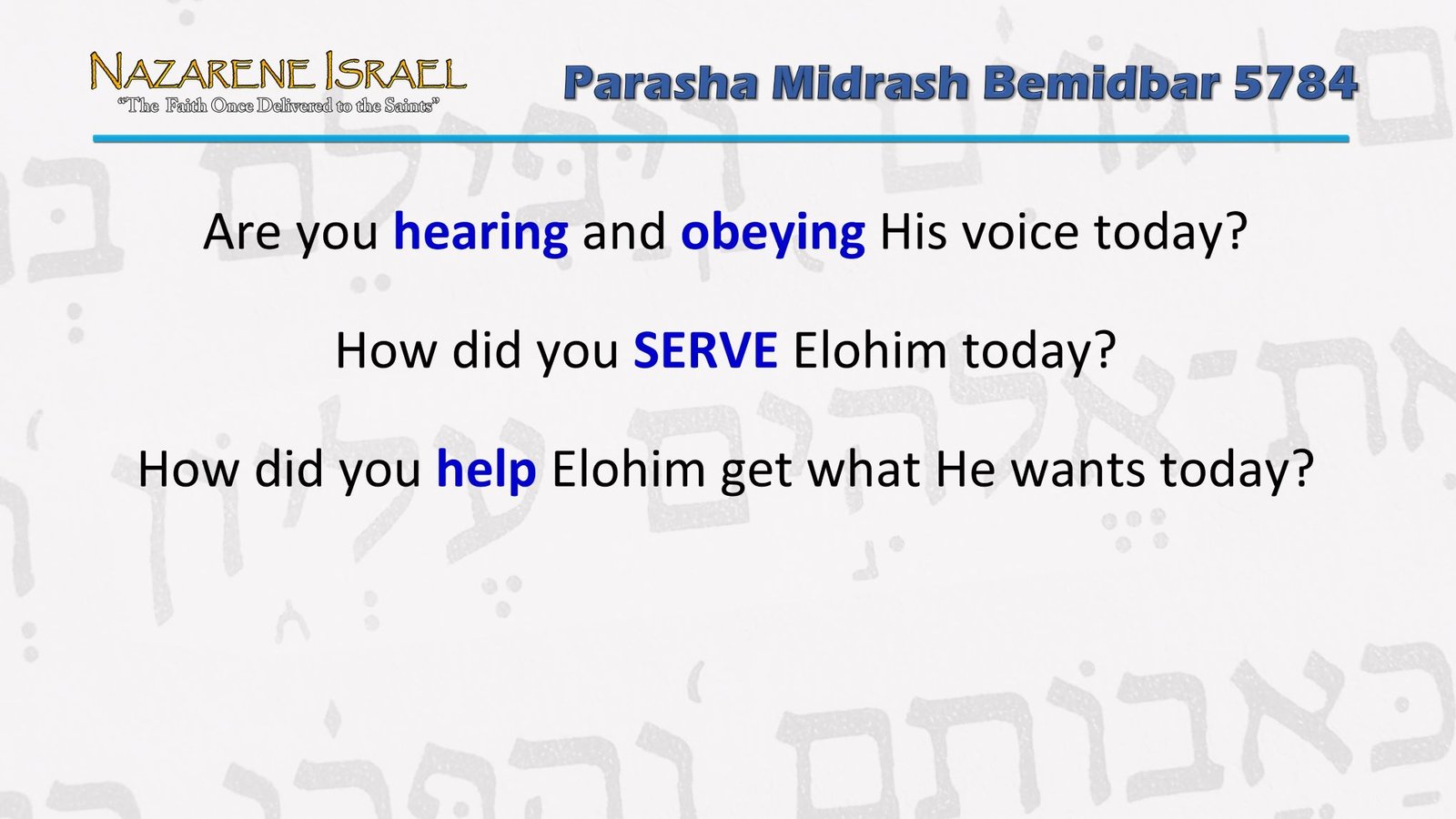
Are we living a parasitic lifestyle, only in it for the blessings? These are the questions we need to pray about, so that we can all work together to give the Father what He wants.
Shabbat shalom.
Support the Great Commission on PayPal
Support the Great Commission on Patreon
We thank Yahweh Elohim for your love for His kingdom.

